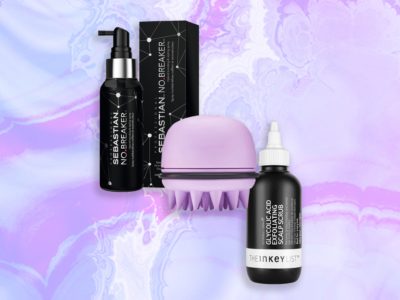
Hartman recommends heading to your dermatologist if you have persistent irritation around the mouth area. Your doctor can prescribe an antibiotic to clear up the rash and help you curate a gentle skin-care routine to alleviate the irritation.
Rosacea
“Many people think rosacea equates to bright red, irritated skin,” says Hartman. But rosacea can look less red on darker skin, or appear similar to acne. According to Estee Williams, a board-certified dermatologist and clinical professor in dermatology at Mount Sinai Medical Center in New York City, the lack of understanding and awareness surrounding rosacea often leads to misdiagnoses. “Pimples, breakouts, zits… everyone knows what acne is, but many people have not heard of rosacea, even though 16 million Americans have the condition,” she says.
Out of those millions of people, not all rosacea cases look the same; the condition may present itself in many various forms. “There are 50 shades of red — anything from rosy cheeks to pimples that are often mistaken as acne,” says Williams. “Even the most seasoned dermatologist may find it challenging to distinguish the two, and what’s more, acne medications tend to make rosacea worse.”
Williams warns that if you have sensitive skin, tend to blush or flush easily, or have pink pimples that take a long time to heal, you might have rosacea. But a proper diagnosis is key to treatment, as a misdiagnosis could potentially exacerbate the condition.
“It’s important to diagnose rosacea properly because its treatments are quite different than treatments for acne or seborrheic dermatitis,” says Hartman. “Using an acne treatment on rosacea skin could actually be quite uncomfortable for a rosacea patient and make the rosacea worse.”
Psoriasis
Many people self-diagnose themselves with a dry, flaky scalp when, in fact, they have psoriasis, according to Joshua Zeichner, the director of cosmetic and clinical research in dermatology at Mount Sinai Hospital in New York City. “Psoriasis is a condition in which your immune system gets angry at your skin and attacks it,” he explains. “We don’t understand why this happens.”
In this case, the skin typically develops flaky plaques, which typically show up on the elbows and knees, but can also be found on the scalp. Dermatologists can suggest prescription options to help with inflammation.
Hyperpigmentation
Melasma is actually a form of hyperpigmentation, which is a broad skin condition in which skin has discolored or darkened for a variety of reasons, such as sun damage or acne scarring. Though it presents similarly, with dark spots on the face, melasma is its own specific condition, which often appears during pregnancy. “People think they have melasma when they really have sun damage,” says Ellen Marmur, a board-certified dermatologist in New York City.
Despite their close relationship, “these skin concerns need very different treatments,” says Marmur. “Melasma needs a very light hand in treatment; if you do too strong of treatment, you can make it much worse.” Whereas, on the other hand, “sun damage can be treated with a very strong laser in order to renew the skin,” adds Marmur.





